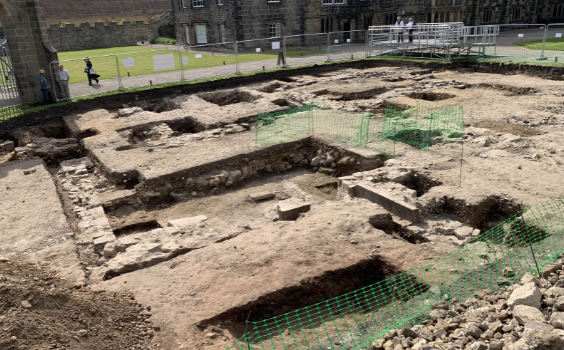And finally… Haselrig’s hidden haunt

Archaeologists at Durham University have helped uncover a ‘lost’ house at Auckland Castle in County Durham built by the infamous Parliamentarian and Puritan Sir Arthur Haselrig.
The team, involving experts from The Auckland Project, conducted digs throughout the summer to discover more about the house commissioned by Sir Arthur when he owned Auckland Castle in the mid-17th century.
Sir Arthur was a key ally of Oliver Cromwell but once the monarchy was restored and returned to power in 1660, he was imprisoned in the Tower of London where he later died.
When the new Bishop of Durham, John Cosin, took over Auckland Castle, he demolished Sir Arthur’s house.
Uncovering Sir Arthur’s house
It had already been established that when Sir Arthur bought the Castle, he used gunpowder to blow up parts of the chapel built in 1300 and set about building a contemporary home for himself.
During the summer digs, archaeologists found parts of the demolished chapel recycled as rubble in the walls of the new house.
The researchers established the house’s layout and unearthed items likely belonging to labourers and tradesmen at the time, leading them to conclude that Sir Arthur’s house was nearly completed but never lived in.
In a separate trench on the Castle’s North Terrace, archaeologists found the rubbish dumps from the kitchens which were likely dumped into a former garden in the 1400s to 1600s.
Several unusual medieval artefacts were uncovered during these digs including a gold flower decoration, an arrowhead, stained glass, several coins and a jet dice.
A history of construction and destruction
Professor Chris Gerrard, the project’s academic lead from the Department of Archaeology, said: “The fact that Haselrig seems never to have occupied the house is unexpected and has helped shed more light on the timelines of construction and destruction at Auckland Castle by Haselrig and the subsequent Bishop, John Cosin.
“There has been so much interest from members of the public too, and collaboration with The Auckland Project has helped to introduce more local people to Durham’s world-class archaeological department at work.”
Archaeologists are set to return to the Castle for a final season of excavations in June 2025.





















